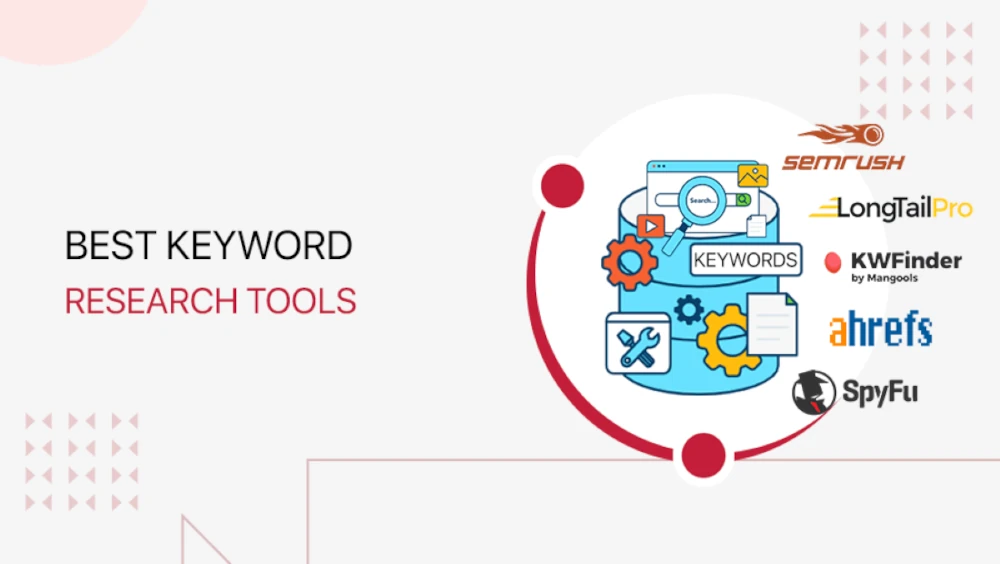Keywords research is still the basis of every effective SEO strategy. The search engines are improving and people are changing in their behavior; hence, the tools that we use to find out some valuable keywords should also be improved.
By 2025, the field of SEO tools will have undergone evolution and will provide more complex features such as AI-enhanced insights, competitor analysis, and semantic optimization of searching.
The following article talks about the most effective SEO tools that can carry out efficient keyword research in 2025 so that you can keep ahead in the highly competitive digital world.
The importance of Keyword Research in 2025
It’s necessary to get an overview of why keyword research is a critical part prior to venturing into tools:
- Search Intent Optimization: Search engines are becoming more concerned with user intent rather than matching the keywords.
- Semantic Search: There are tools that assist in finding associated terms and phrases in search of more relevant content.
- Competitive Advantage: You can always use what the competition is doing with keywords.
Content Strategy: The topic choice and production are based on keyword insight.
Best Keyword Research in 2025

These are our top recommendations on the best tools to turbocharge your keyword research in 2025:
1. Ahrefs
Ahrefs has remained the best in the market in terms of SEO tool attributes:
Keyword Explorer: Gives search volume, keyword difficulty and click-through rate (CTR) information.
Gap Content Analysis: Shows you the keywords that you are ranking on, but your competitors are not.
AI-Powered Suggestion: It suggests semantic keyword ideas depending on user intent.
Rank Tracker: Deals with the ranking of your keywords over time.
2. SEMrush
SEMrush is still a popular choice due to the variety and richness:
Keyword Magic Tool: Produces thousands of keyword suggestions by means of advanced filters.
Position Tracking: Monitors the positions of keywords in the many search engines.
Competitor Analysis: Shows which keywords are working for the competitors — a valuable edge for businesses offering SEO services Birmingham.
Trending keywords: Find trends about new keywords in your niche.
3. Google Keyword Planning
The tool is free, but powerful, in particular, when it comes to the integration of PPC and SEO:
Search Volume Data: Entails competitive levels and exact search volumes.
Cost-Per-Click (CPC) Insights: Assists in focusing on keywords with value.
Ad Group Suggestions: Provides a keyword grouping of the campaign to have a better organization process.
4. Surfer SEO
Surfer SEO is concerned with content optimization in terms of keyword research:
Content Editor: Recommends keywords to use in order to optimize on-page SEO.
Keyword Density Analysis: It gets your content to cross-check against well-ranked pages.
Semantic Keywords: Find related Keywords to obtain a better relevance.
5. AnswerThePublic
It is perfect to comprehend the intent of users and suggest long-tail keywords:
Visual Keyword Maps: Uses the idea of visualizing the keyword concepts in a clear manner.
Question-Based Keywords: It is centered on asking questions — a technique especially helpful for agencies focused on SEO services Cardiff.
Seasonal Trends: Emphasis keywords that are seasonal.
6. Ubersuggest
An affordable device that has a powerful functionality:
Keyword Ideas: Comes up with a broad number of suggestions on keywords.
Competitor analysis: Displays top keywords and the backlinks of competitors.
Content Ideas: Suggests an idea to write upon using popular keywords.
7. Moz Keyword Explorer
The simplicity and accuracy of the tool offered by Moz are well-known:
Keyword Difficulty Score: Allows determining the competitiveness of keywords.
SERP Analysis: Allows knowing information about the pages that are ranked higher with a keyword.
Keyword Suggestions: Provides keywords or phrases that are similar.
8. Keywords Everywhere
A Chrome add-on that makes keyword research portable:
Real Time Data: Performs a presentation of search volume, CPC, and competition on the search engines.
Relevant Keywords: Recommends other words during a search.
Trend Analysis: Monitors the popularity of keywords over time.
9. KWFinder
A simple and easy-to-use tool for beginners and experts:
Long-Tail Keywords: Concentrates on low competition but high value keywords.
Local search engine optimization: Gives you location-specific keywords.
SERP Preview: Displays the first results of any keyword.
10. SE Ranking
A general SEO tool that has sophisticated keyword research:
Rank Tracker: Tracks Keywords in the search engines.
Competitor Research: Comes up with the keyword strategies of competitors.
Arranges keywords into clusters to target them better — particularly useful for SEO experts Glasgow looking to segment local markets.
Future Emerging Trends in Keyword Research Tools by the year 2025

The tools of 2025 are not restricted to the keyword suggestions alone; they are based on the latest technologies that can give more insight:
- AI and Machine Learning: The tools now operate AI in relation to the forecasts of keyword trends and user behavior.
- Voice Search Optimization: As the voice assistants increase, devices pay attention to conversational keywords.
- Semantic Analysis: Sophisticated algorithms discover related words and ideas, so that the optimization of content is improved.
- Other Platform Integrations: Most of the tools have been integrated with CMS, analytics and PPC platforms to avoid consumer productivity.
The Best Way To Select The Keyword Research Tool
Having a large number of tools to choose from, the choice of the appropriate one should be based on your needs:
- Budget: A few of them are free, whereas others involve a subscription.
- Features: Decide in favor of competitor analysis, rank tracking or content optimization.
- Ease of Use: Find tools that have easy interfaces and have good support.
- Scalability: The growth factor of your business must be capable of expansion.
Tricks on How to Conduct Good Keyword Research in 2025
- Target the Long-Tail Keywords: They are less competitive and usually more converting.
- Competitive analysis: Find areas in their strategies that are weak to exploit.
- Utilize AI Insights: Get predictive Analytics to be ahead of the trend.
- Be Optimized to Voice Search: Make your keyword strategy conversational.
- Up To Date: The trend in keywords is highly dynamic, refreshing your researched can make all the difference.
Conclusion
Keyword searches in 2025 are more progressive and dynamic than ever before. The relevant tools can do a lot of good, helping you to find the insight, optimize your content and rank higher than competitors. The tools above will be helpful at any stage of your work with search engine optimization, being, in fact, targeted at all levels: both a novice and an experienced SEO specialist. Remaining informed of new trends and utilizing these tools to their best can guarantee that your SEO will be tightly built and unbreakable in the future.
You may invest in proper keyword research tools now, and by the year 2025, your organic traffic will fly high! And if you’re passionate about sharing your SEO expertise, consider contributing to a write for us section on a relevant tech platform.
FAQs
Q1: Which is the best keyword research tool of 2025?
A: Both Ahrefs and SEMrush are still the favorites because of their robust functionality, including competitor research, AI-related information and an extensive keyword monitoring.
Q2: Are there free keyword research tools to use?
A: Yes, Google Keyword Planner is a great free tool as well as AnswerThePublic, quite useful to look into the insight on user intent and long-tail keywords, especially PPC.
Q3: What tool is recommended for beginners?
A: KWFinder and Ubersuggest are simple to use, inexpensive and suitable to novices requiring easy-to-use interfaces and sound information on keywords.
Q4: Which is the most effective long-tail keywords locating tool?
A: AnswerThePublic, KWFinder, and Surfer SEO are efficient in the search for long-tail and question keywords.
Q5: What are the AI-based SEO tools in 2025?
A: Ahrefs, SEMrush, and Surfer employ AI to make keyword suggestions, forecast trends and interpret user intent.
